Introduction
Data has become one of the world’s most valuable raw materials for business operations. At the same time, the use of data in companies is under close scrutiny, as an increasing number of customers demand more transparency in how companies collect and use data, and the opportunity to influence the use of their data.
The fair use of data is part of responsible business and, at its best, creates a new competitive advantage for companies. Seeing data as a resource and including it in corporate social responsibility (CSR) makes it easier to understand different perspectives related to the use of data. Fundamentally, data is an expense item resulting from the collection and storage of data, for example. Only the insights, services and products yielded by its full use and refinement create added value for a company.
The responsible use of personal data has already become an integral part of companies’ everyday operations as legislation has evolved. Particularly major impacts could be seen when the EU’s General Data Protection Regulation (GDPR) entered into force in May 2018. Compliance with the General Data Protection Regulation is an important step towards a more sustainable use of data. However, according to a recent communication from the European Commission (European Commission 2020a), the GDPR still offers rather limited possibilities for influencing data control, from an individual’s perspective. From this perspective, organisations have, to an increasing extent, an obligation – and simultaneously a good opportunity – to exceed the requirements of the GDPR. European companies have the ingredients to make themselves pioneers of a fair data economy, increasing their attractiveness as partners and strengthening their competitiveness on the global market.
In genuinely human-driven business, the sustainable use and management of data is an essential part of CSR. The definition of the relationship between these two, data and CSR, is only just beginning. In spring 2020, Sitra decided to start reviewing, defining and outlining this theme as a part of IHAN® – the fair data economy project (Sitra 2020). The content of the memo was created as an output of the Making data part of CSR workshop series (Sitra 2020), co-ordinated by Sitra and FIBS (FIBS 2020), the Nordic countries’ leading promoter of sustainable business. Representatives from dozens of large and small companies and public-sector organisations in Finland participated in the workshops in between February and June 2020.
The memo is especially intended for management, business developers, customer relationship management (CRM) professionals and those responsible for IT administration and CSR. We hope that it is also helpful for management consultants and analysts as well as marketing and communications professionals. We also want to highlight existing concrete solutions, good practices and tools that aim at the fair use of data. Above all, we wish to encourage organisations to look at their business and CSR practices from a new perspective.
This work is part of IHAN, Sitra’s fair data economy project, which aims to improve the competitiveness of European companies by promoting a human-driven, trust-based European data market.
Summary
The starting point of a human-driven fair data economy is to create the ability for an individual to influence the use of their data as part of a viable and fair digital ecosystem. In a fair data economy, individuals are seen as active agents, not solely sources of data or objects at whom supply is targeted.
Companies have the responsibility to act respectfully, fairly and transparently towards both customers and partners, which should also be seen in the use of data. In the future European data economy, data will be shared more freely in successful ecosystems. In fair data partnerships, data is shared between different parties with consent based on mutual agreements in a seamless and transparent way.
Data has become an important resource and raw material for companies, the smart and responsible use of which yields benefits both for the company itself and for its stakeholders. As a result, it is also useful to review the role of data within the framework of CSR.
Data responsibility is considered a phenomenon that overarches all areas of CSR. Traditionally, corporate responsibility is divided into economic, social and environmental responsibility. CSR is linked to human rights, sustainable development, social factors and good governance. A responsible company operates in compliance with law, regulations, rules and international conventions and is capable of reporting on its operations and results transparently. Companies for which CSR is a strategic focus area strive to exceed statutory requirements and build responsible business into a competitive advantage.
The aim of international guidelines based on voluntary action is to promote companies’ responsible operations and reduce the negative impacts of their operations on the environment and human rights. For example, the key voluntary guidelines for multinational companies are the UN’s Guiding Principles (UN) and the OECD’s Due Diligence Guidance (OECD 2018). Some of the guidelines based on voluntary action have also been included as obligations in EU and national legislation. Thus far, legislation has focused on regulating particularly high-risk sectors or setting an obligation to report on actions with which companies implement due diligence (Ministry of Economic Affairs and Employment 2020, pdf in Finnish.)
This memo looks into the role of data as part of responsibility and compiles proposals, practices and ways to develop the company’s operations towards a more ethical, human-driven and sustainable data-use culture and business.
In this memo, we present three theses, on the basis of which companies can promote a more responsible use of data.
Thesis 1. Dialogue with stakeholders is indispensable for data-responsible business.
Thesis 2. Data-sharing partnerships promote sustainable business but require strategic decisions.
Thesis 3. Example solutions show the way to others.
In addition, the memo describes the distinguishing characteristics of a data-responsible company and proposes actions for companies promoting data-responsible operations. Our main argument is that the successful digital services of the future are built on new kinds of business models, are based on trust and create value for everyone: companies, the individual and society.
The key distinguishing characteristics of a data-responsible company are as follows.
- The company has defined the essential data responsibility themes by reviewing data-related opportunities and threats both from its own perspective and from that of its stakeholders.
- The company creates value with the aid of data – even gratuitously – not only for its own operations but also for people, society and the environment.
- The company is transparent about the collection, management, use, sharing and erasure of data.
- The company’s consideration of the rights of individuals exceeds statutory requirements.
- The company understands its data repositories and has the competence required to use them.
- The company has defined ethical principles for developing and using algorithms and artificial intelligence.
- The company collects data appropriately and transparently and sees to good data life-cycle management.
- The company shares data with its stakeholders.
Using data fairly is an item already on the CSR agenda of pioneering companies. For digital services targeted at consumers in particular, the key is that the consideration of the rights of individuals exceeds statutory requirements. At the moment, attention is paid particularly to data-security and privacy-protection questions, but the theme should be examined more extensively. More efficient use of companies’ data repositories is also an important part of CSR. By sharing data, a company can generate well-being not only for itself but also in its surroundings. Full and transparent use of data under common rules supports responsible business and enables business growth.
1 What does data as part of CSR mean?
1.1 Responsible use of data builds a fair data economy
The data economy is an area of the economy in which business models are based on various forms of data use. The EU has become aware of the opportunities it offers and in spring 2020 it published a new European strategy for data (European Commission 2020b), aimed at increasing the competitiveness of European companies. The data strategy pursues a single European market for data, where data flows more freely between different sectors. This makes new business models and new, innovative digital services possible.
Sitra has compiled a list of proposals to make the European data strategy work, intended both for companies and for decision-makers (Sitra 2020). Proposed actions include, for example, the strengthening of the rights of individuals for the sharing, management and use of their data and solidifying data competence among both individuals and companies.
In a fair data economy, services and data-based products are created ethically and in a manner that creates value and well-being for everyone: individuals, companies and society. Companies can create completely new kinds of benefits and advantages when they share data in data partnerships and networks among companies and other parties in a sustainable manner and with individuals’ consent.
CSR applies to both personal and inter-company data. However, the starting point of a fair data economy is a human-driven approach and the innovation of new business models and services with the aid of personal and other data.
The principles for a European data economy also emphasise a human-centric approach and sustainability. The principles highlight access to and the sharing of data, the strengthening of individuals’ ability to act, the significance of innovation as well as trust and learning. On the basis of these aspects, companies can also review and develop their operations.
Principles of a fair data economy: Principles for a human-centric, thriving and balanced economy (pdf) (adapted) (EU Council 2019).
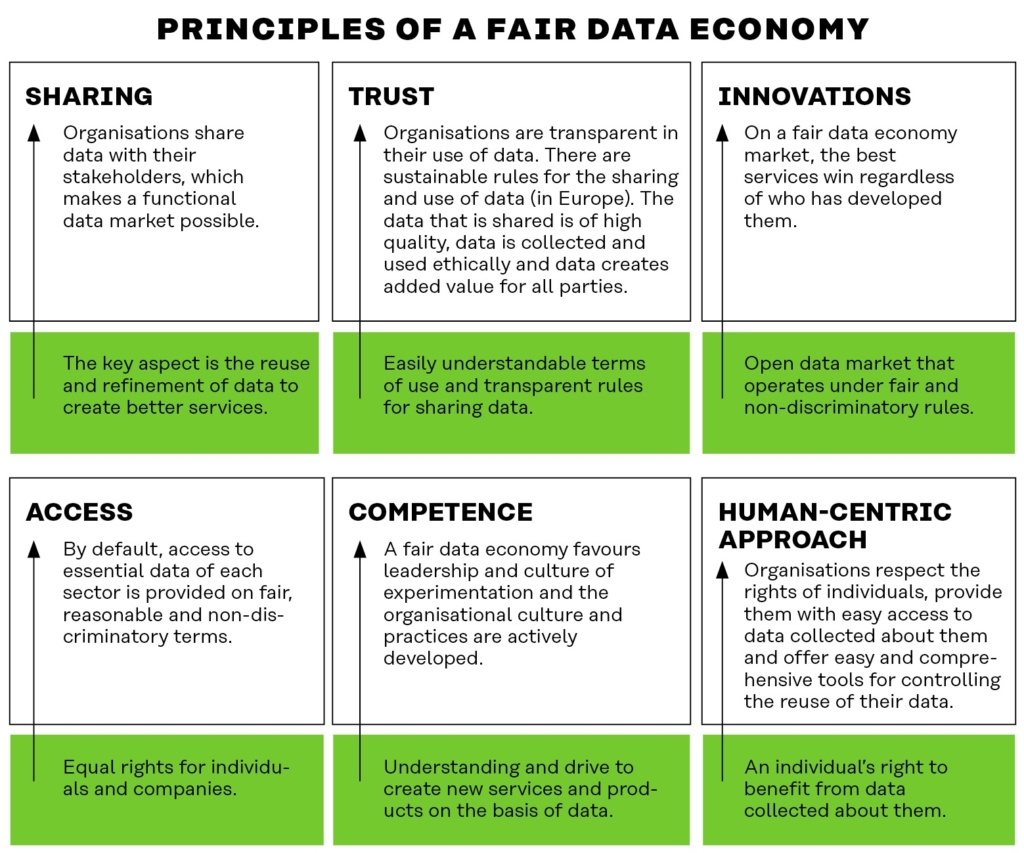
1.2 Status of data responsibility
As a consequence of the EU’s General Data Protection Regulation, companies protect the privacy of their customers better. However, when it comes to the sharing of data, the situation is not as good, even though 49 per cent of Finnish companies have reported that they already share data (pdf) (Sitra 2019) with other companies. There is still a lot of room for improvement in how and to whom data is shared. It is noteworthy that large companies share less data than small and medium-sized enterprises (SMEs) (CTO 2019).
A survey (N=47) conducted among Finnish companies by Sitra in spring 2020 indicates that the companies who responded to the survey still have a long way to go to the comprehensive, responsible use of data. The survey is indicative and requires further examination. However, it is worth noting that while the respondents believed that the responsible use of data creates added value for the company’s business, specific action to ensure the more responsible use of data was often lacking. For example, nearly half of the companies that the respondents represented had no data strategy for different data-use aspects (data acquisition, management, storage, sharing and so on). Communicating the organisation’s use of data to external parties appears to be a weakness in general.
However, it should be taken into account that in different companies the responsible use of data is probably understood differently. This is one of the reasons why it is important to increase and establish a shared understanding of this theme.
Almost a quarter (23%) of the respondents believed that added value could be created to some degree. A small proportion (9%) of the respondents were of the opinion that there would be hardly any added value created, but none of the respondents stated that no added value would be created at all.
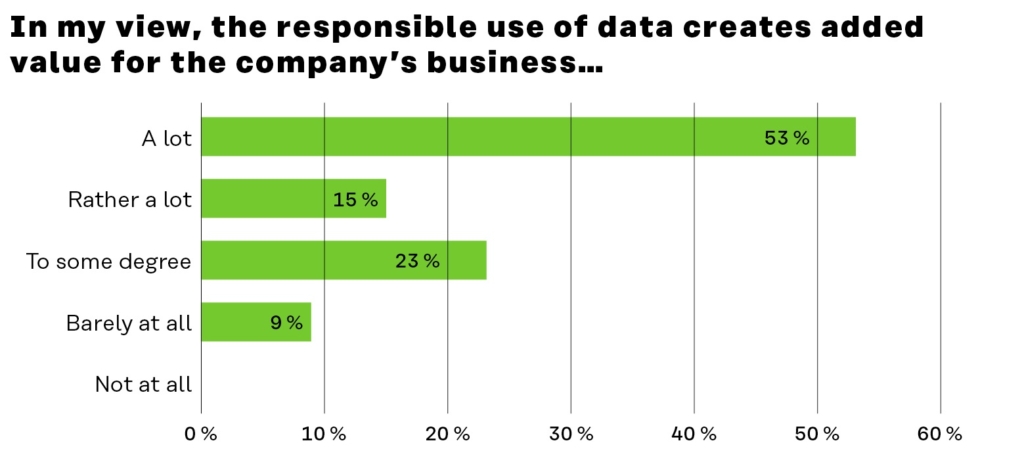
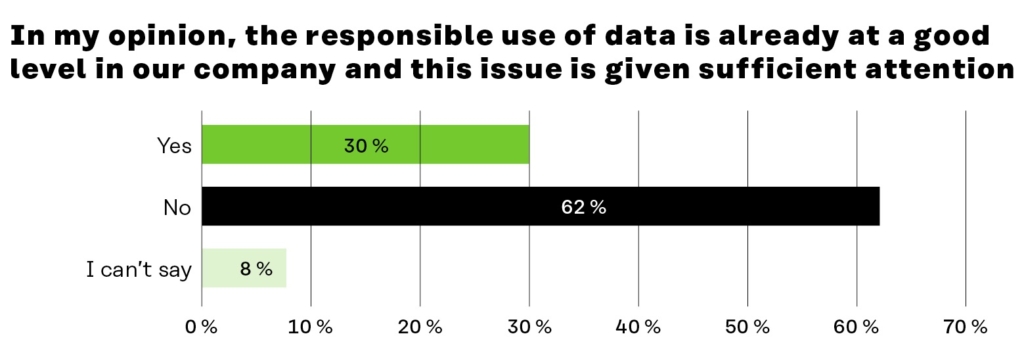
The majority reported that their company aims to achieve a competitive advantage through the responsible use and management of data. Most believed that the responsible use of data creates added value. Data plays a significant role in the future plans of companies but at the same time, data competence and understanding vary. Well over half of the respondents said they need assistance and support from various parties. Support for making sustainable use of the potential of the data economy is needed from various sources, including regulation, expert organisations and other companies.
Many of the respondents indicated that the responsible use of data is not yet at the desired level among companies and that this topic is not given sufficient attention. With regard to the use of data concerning individual people, pressure from consumers is a fairly new phenomenon, and the actions and thinking of companies are lagging behind to some degree. If we think of data-related CSR as, for example, a larger company having the responsibility to share its data repositories with smaller companies, this type of thinking is even more recent. This means that companies that act swiftly would have the opportunity to differentiate themselves, develop their competences and reap the benefits earlier than others.
In addition to competence development, there is a need to make the operating conditions more favourable to Finnish and European companies to enable them to compete with the giants of the international data economy on a more equal footing and to create data economy success stories in Europe that differentiate themselves by making fair use of data.
2 Dimensions of the responsible use of data
The CSR focus areas are determined in organisations on the basis of their significance for the company’s value chain, business and stakeholders. In traditional thinking, a company’s primary goal is to generate profit for shareholders. In a sustainable business model, a company redefines its ecosystem and operating models, which it uses to strive to create value for all of its stakeholders (Porter and Kramer 2011).
From the perspective of business benefit, there is scientific proof that companies’ sustainability programmes not only correlate positively with good financial performance but also play a substantial role in achieving this performance level (Whelan, Tensie, Flink, Carly 2016). (McKinsey 2014; Ameer and Othman 2012.)
Other research also supports the thinking described above. For example, a survey conducted by Nielsen in 60 countries in 2015 showed that 66 per cent of consumers would pay more for sustainably produced products and brands. When compared to previous years, the growth in the percentage was significant (2014: 55 per cent; 2013: 50 per cent). Nielsen’s consumer research survey conducted in the United States before the COVID-19 pandemic revealed that 74 per cent of millennials prefer, as far as possible, buying products and services that match their values. There are many consumer studies with similar findings. Nevertheless, the phenomenon should also be viewed from the personnel’s perspective as losing valuable experts is expensive for companies. According to the World Federation of Advertisers (WFA), a global organisation representing advertisers, 82 per cent of the employees of its member organisations would consider leaving the company if the company’s use of data was not ethical.
2.1 Data as a resource that increases trust
When assessing their CSR, companies often use the UN’s Sustainable Development Goals (UN 2020) or focus on the aspects of environmental and social responsibility and good governance. Traditionally, use of data has been considered to be part of social responsibility, through actions and aspects related to customers’ data security and privacy protection.
Sitra’s The use of Digital Services survey in 2019 (Sitra 2019) targeted at the general public showed that many people wished that the use of data collected about individuals was transparent and that there were means, such as a fair data label, for identifying companies that use data in an ethically fair manner. The survey was conducted in four European countries and it also revealed people’s concern about their privacy and a lack of trust in digital service providers.
To ensure that the responsible use of data also yields business benefits, the topic should be looked at from a wider perspective than one that simply concerns questions related to privacy protection. Viewing data from the perspective of economic responsibility and treating it equally to the company’s other resources may reveal new kinds of innovation opportunities, make processes more efficient and, as a result, reduce costs.
Data without a purpose is an expense item. Only the full use and refinement of data results in new services and innovations that serve society and individuals more extensively and in novel ways.
Including the responsible use of data in CSR supports traditional data-related risk-management methods and helps to identify and manage risks such as business, customer, data security and reputation risks. On the other hand, transparency in data use helps to increase the confidence of customers, employees and other stakeholders in the company’s operations or the service being used. Trust capital can be seen as one of a company’s key success factors.
Unlike conventional business risks, social and environmental risks often emerge over a longer period of time and may have diverse impacts on a company’s operations. The retroactive management of the resulting impacts may be challenging for the company. The effects of a data leak or a data breach can be seen immediately but it takes a longer time for trust, a critically important factor for business, to erode. It is also more difficult to perceive especially if customer relationships are distant and service development is carried out purely from the company’s own perspective.
2.2 Data sharing as a responsible act
Data becomes a more integral part of a company’s responsible operations when it starts to benefit not only the company itself but also the company’s partners, society or individuals in the form of better services, for example. As with all resources, the responsible and efficient use of data seeks economic growth and profitability. According to a recent report (Glougherty Jones, Gartner 2020), organisations that share data with their partners get three times the business benefits when compared to companies that do not share their data. When CSR is expanded to apply to the sharing of data (pdf) (Seppälä & al. 2019) in responsible data networks (Malkamäki 2020), companies create added value for each other and stakeholders, such as their customers.
But how can a company recognise the current and future significance of data for its business and competitiveness and create principles and processes that release data for sharing? As data sharing is probably a greater risk and expense item than data erasure, it should be justified with short-term or long-term benefits for the company. Other challenges associated with data sharing may be, for example, actions or questions related to data management, lack of tools and technology, attitudes among stakeholders or legal obstacles and data security questions. On the other hand, organisations should take a moment to consider the risks and lost opportunities resulting from a decision not to share data (Clougherty Jones, (Gartner) 2020.)
A data strategy helps organisations grasp their data repositories, better understand and use the data they have, identify gaps and, consequently, ease the sharing of data through ecosystems. Data-sharing partnerships are created with parties that collect, store and share data responsibly and transparently. A well-functioning data strategy helps organisations achieve these goals (Wäyrynen 2020.)
2.3 Assessing the environmental impacts of data use
The environmental and climate impacts (Seppälä, Ylhäinen, Hiekkanen 2020) of data use should also be taken into account. In addition to the reduction of negative impacts, attention should also be paid to benefits yielded by data, enabling the protection of the environment and biodiversity and the mitigation of climate change.
Energy consumption in the ICT sector is increasing as the number of devices and the volume of data transferred grow rapidly. The greenhouse gas emissions and material consumption resulting from ICT operations have been given relatively little attention when compared to the emissions generated by other sectors, such as industry. Environmental impacts are generated by data centres, ICT networks, terminal devices and the use of services. Forecasts indicate that, in 2030, more than one fifth of the world’s energy consumption will be attributable to the ICT sector.
For example, minimising the collection of unnecessary data and, as a result, using machine and computation capacity more efficiently as well as choosing energy-efficient solutions are measures that improve both environmental and social responsibility.
Dimensions of the responsible use of data

3 Towards more ethical data use and business
What kinds of things should companies and organisations take into account when aiming to make data a more integral part of CSR? The development of a company’s responsible use of data can begin on the basis of three key theses.
3.1 How can the sustainability of business be promoted from the perspective of fair data use? – Three theses
Thesis 1. Dialogue with stakeholders is indispensable for data-responsible business
The development of business and services in co-operation with stakeholders helps to understand customers’ points of view on the use of data as well. Trust capital can be increased with comprehensible, truthful and honest interaction. Companies can promote dialogue with their stakeholders by the following means, for example:
- by actively taking part in discussions on the use of data in different forums;
- by comprehensibly communicating about their data use and operating models both internally and with those outside the organisation;
- by making use of the available interaction-enhancing tools for planning the ethical use of data, such as the Data Ethics Canvas (Source: Open Data Institute).
Companies that use customer data intensively should see the opportunities offered by including customers and partners in data-use processes.
Thesis 2. Data-sharing partnerships promote sustainable business but require strategic decisions
A company’s data strategy is a central element of developing the data-sharing ecosystem. The data strategy links the digital development of data to the big picture. It also addresses how to operate within the company to create value from data with services and products. Companies should define:
- what kind of data generates the highest value;
- where it is collected from and how it is used;
- what kinds of benefits data sharing offers and what kinds of benefits are sought;
- what kinds of partners are included in co-operation and what kinds of requirements they are subject to.
In addition, solutions that promote the sharing of data, such as joint agreement models, are needed. For example, the Rulebook for a fair data economy (Sitra 2020) is an open toolbox that makes it easier and faster to build and join responsible partnerships. The rulebook contains ready-made agreement templates and code-of-conduct templates. It can also function as a way of demonstrating responsible data sharing and use models to funders, partners and markets.
Thesis 3. Practical models and example solutions show the way to others
Specific examples are needed to identify as clearly as possible how data is managed and how its use is promoted. Copying good practices and making one’s own practices more visible accelerate the journey towards a fair data economy ecosystem.
For example, transparent and clear reporting also helps to develop key internal processes and increases trust between a company and its partners and customers. Open and active partner communications about the means and methods that the organisation applies to manage and use data increase transparency and co-operation opportunities. A good method is to use existing channels for showcasing the organisation’s own good practices.
3.2 Examples of a fair data economy
4 Distinguishing characteristics of a data-responsible company
4.1 Data responsibility increases trust
The responsible processing of data means that data generated by people’s actions and that influences people’s lives is processed justly and ethically, applying open principles. This kind of processing protects data sources’ privacy and right to self-determination and builds the trust required for innovations.
A thorough analysis of data responsibility from an ethical perspective also helps concentrate on just the right issues. Ethical analysis is related to not only compliance with existing legislation and data-use rules but also the maintenance and building of trust, the pace of technological development and a deeper understanding of data use (Internet Society 2019) (pdf).
Data ethics can be looked at from three perspectives. The first perspective focuses on data itself and how it is generated, stored, collected, shared and used. The ethics of algorithms are related to automation and its relation to the processes of data processing. The ethics of practices concentrates on the responsibilities and liabilities of organisations and people involved in the above processes (Lehtiniemi 2020.)
The distinguishing characteristics of a data-responsible company provided in this memo are derived from the principles for a European data economy. The realisation of responsible data use begins when the company does its best to ensure the transparency of data use and the life cycle of its data repositories, as well as considers the individual’s wishes and rights in a manner that exceeds the requirement of the GDPR. In addition, the company must ensure that it has an understanding of and updated competences for managing its data repositories. This also makes it possible for the company to share data with its stakeholders and, as a result, increase the volume and diversity of its data repositories.
Data responsibility consists of tangible actions. The table below contains recommendations for actions and operating methods that a data-responsible company or organisation should promote in its operations.
4.2 Actions and practices of a data-responsible company
When an organisation wants to promote its responsible use of data it should scrutinise the operations in its different functions both internally and externally. The following table (pdf) contains views collected from the organisations that participated in workshops between February and June 2020, listing the areas that companies or organisations should pay attention to during their journey to the more responsible use of data.

5 Vision – How to proceed towards the fair use of data
Why should an organisation take the responsible use of data seriously and concentrate on it? The key reason is trust. When consumers’ or other companies’ distrust towards data collection increases, data-responsible operations and services are able to stand out and may create a competitive advantage for the company.
Data-responsible operating does not only mean minimising data collection and fine-tuning practices but also putting oneself in the position of a data source. Questions such as the following may be helpful in considering the topic. “If I were a user of this service, would some of its uses of data surprise me? Or dismay me?”. Or, “If my company’s use of data were published in a news story tomorrow, would I worry about our reputation?” (Internet Society 2019).
In consumer businesses in particular, marketing and customer relationship management practices should be reconsidered. Companies should ask themselves a few basic questions about the fair data economy. Do the company’s marketing and data-management practices meet the individuals’ need for respect for their privacy? Is the starting point of service development an active and open dialogue with customers and do customers perceive the company as a reliable partner that is capable of making new, personalised services available? Do maximal data collection and the energy used for it serve the company’s climate goals?
Actions are a better way to build trust than words. In customer interaction, a responsible business approach can be seen as openness and, in more tangible forms, as fair cookie policies and reasonably short terms of service that are easy to understand. Product information is offered actively through clear communications that are readily available to customers throughout value and delivery networks. Communications are always bilateral or multilateral: the customer and their needs are at the centre of service development from the outset. Easy-to-use tools and user interfaces with which the customer can influence the use of their data are developed and offered proactively. They also serve as a feedback channels to the company or the ecosystem service. As a rule, data collected through marketing is based on needs and optimised, not maximal, and it is used fully and responsibly in service development.
There are already proven examples and tools for promoting data responsibility and they are constantly being developed further. It is useful for companies and organisations to learn more about existing solutions when they are starting their journey towards a fairer use of data.
Other tools used by companies and organisations to promote the efficient use of data
Conclusions
We hope that the actions and means described in this memo help companies in a more comprehensive consideration of their opportunities to promote the responsible use of data and its role in their business development and CSR. In addition, we hope that the views and development ideas presented in the memo inspire discussion about this topic in different fields – not only in companies but also among political decision-makers.
In Sitra’s survey, more than half of the companies indicated they need support from various parties with regard to data sharing and the responsible use of data. Examples of these parties include the government and its regulatory and supervisory bodies, advocacy organisations, various networks and experts. There is room for development at different levels, ranging from decision-making to the grass-roots level, to ensure that a data economy based on European values starts yielding the benefits that can be expected from it.
Sitra’s fair data economy project looks at the promotion of a human-driven data economy from various perspectives, one of which is the inclusion of data in CSR. Ethical, legal, economic and social perspectives are all important when it comes to the fair use of data. Consequently, a holistic approach at the data strategy level is useful, reduces sporadic, random actions and, at its best, increases the efficiency of different customer or production processes.
We would like to thank the participating company and public-sector representatives who devoted their time during the spring and summer 2020 to participating in the Making data part of CSR workshop series and who have made their expertise available to us by commenting on the results and bringing new perspectives into play. The memo is a summary document of discussions with the companies and their views. The interest and enthusiasm of the pioneer companies has been crucial for the progress of this work. Special thanks for interviews and good practical examples to OP Financial Group, Oriola and Sensotrend.
Even if this topic is already familiar to some companies, it is new for the majority, and thus requires further review and analysis as well as the building and establishment of best practices. Work now continues with the development of the fair data economy criteria, for example. In the near future, the criteria will help companies assess the data economy maturity of their operations. Another goal is to promote the creation of a fair data label or other means to enable people to identify and choose products and services that use data responsibly. The steps and solutions presented in this document make it possible for organisations to prepare themselves for a fair data economy of the future.
Sources
Ameer R. and Othman R. (2012): Sustainability Practices and Corporate Financial Performance: A Study Based on the Top Global Corporations.
Clougherty Jones L. (Gartner) (2020): Flip ‘Don’t Share Data’ Mantras — Introducing Gartner’s ‘Must Share Data Unless’ Data Sharing Model.
CTO (2019): How we use data is evolving (Data on the Move, CTO Survey).
European Commission (2020a): Communication from the Commission to the European Parliament and the Council. Data protection as a pillar of citizens’ empowerment and the EU’s approach to the digital transition – two years of application of the General Data Protection Regulation.
European Commission (2020b): Communication from the Commission to the European Parliament, the Council, the European Economic and Social Committee and the Committee of the Regions. A European strategy for data.
EU Council (2019): Presidency discussion paper Towards a human-centric, thriving and balanced data economy.
FIBS ry (2020). Finland’s leading promoter of sustainable business.
Internet Society (2019): Policy Brief – Principles for Responsible Data Handling.
Kanta (2020): Kanta is for everyone.
Lehtiniemi T. (2020): Imagining the Data Economy, University of Turku.
Malkamäki, Saara (2020): What is a data network? Sitra.
McKinsey (2014): Profits with purpose: How organizing for sustainability can benefit the bottom line.
Ministry of Economic Affairs and Employment (2020). Oikeudellinen selvitys yritysvastuulaista (material in Finnish on legislation related to corporate social responsibility).
OECD (2018): OECD Due Diligence Guidance for Responsible Business Conduct.
Office of the Data Protection 2012: Laadi tietotilinpäätös -opas (Guide for creating a data balance sheets in Finnish).
Open Data Institute 2020. What is the Data Ethics Canvas?
Porter M. E. and Kramer M. R. (2012): Creating shared value. Harvard Business Review.
Seppälä T., Hakanen E., Lähteenmäki I., Mattila J. and Niemi R. (2019): The Resource dependency of data. Aalto University.
Seppälä T., Ylhäinen I. and Hiekkanen K. (Etla 2020): Energy and Electricity Consumption of the ICT Sector in Finland.
Sitra (2020): 35 proposals to make the European data strategy work.
Sitra (2020): Corporate social responsibility encompasses data.
Sitra (2020): IHAN – Fair Data Economy.
Sitra (2020): Ihan.fi The European Data Economy Test Bed.
Sitra (2020): Making Data part of CSR workshop series.
Sitra (2020): Rulebook for a Fair Data Economy.
Sitra (2019): The Future of European Companies in Data Economy.
Sitra (2019): The use of digital services. Total level report.
UN Human Rights (2020): Guiding principles on Business and Human Rights.
United Nations (2020): Sustainable Development Goals.
Whelan T. and Flink C. (2016): The Comprehensive Business Case for Sustainability, Harvard Business Review.
Wäyrynen, Anna 2020. Develop your business with shared data. Sitra.
Wäyrynen A. (2020): Director: when did you last think about data strategy? Sitra.
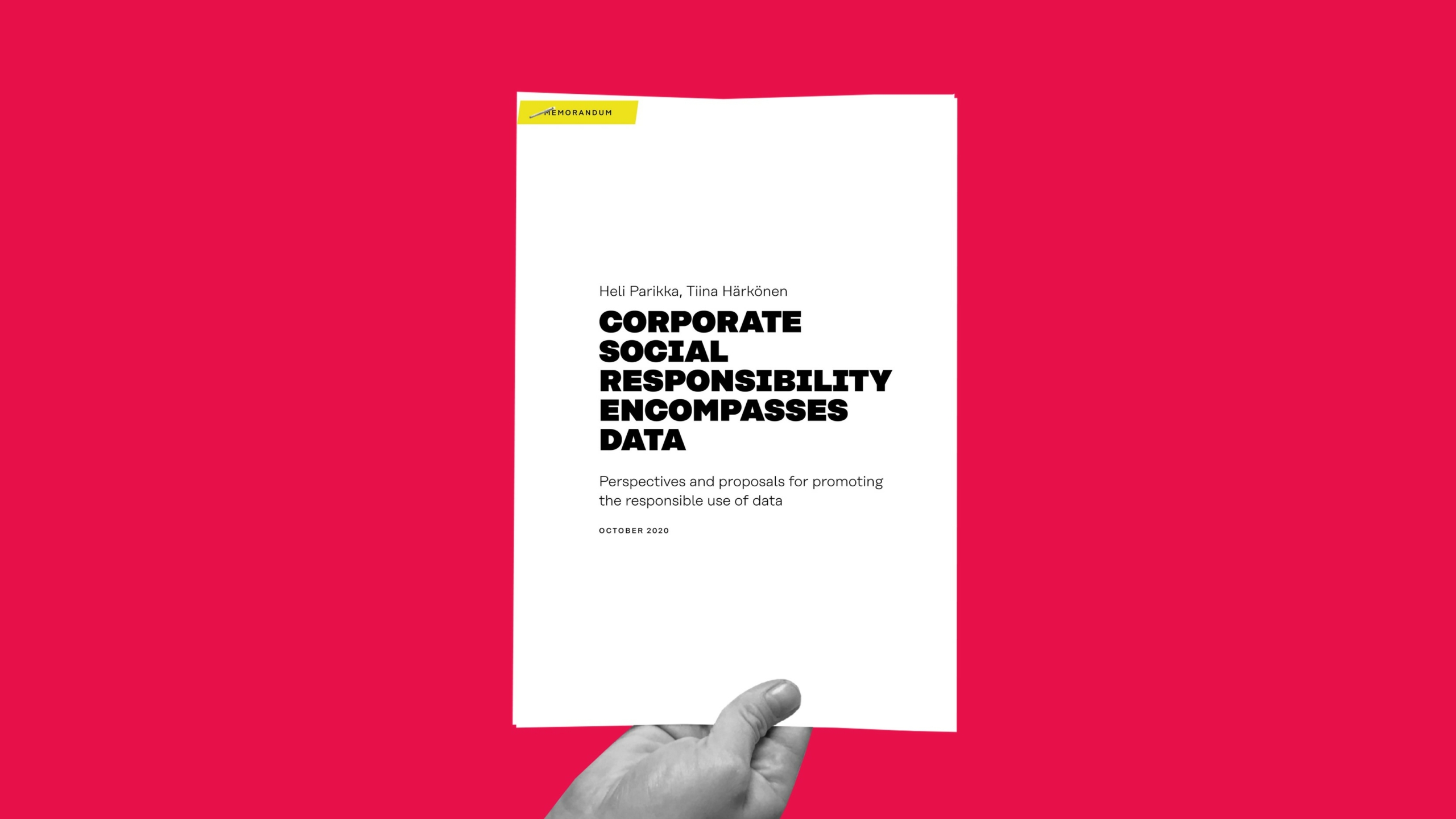



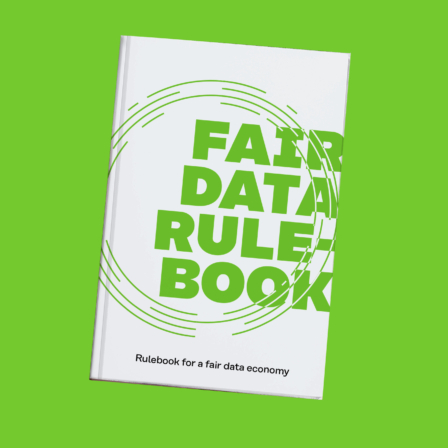












Recommended
Have some more.